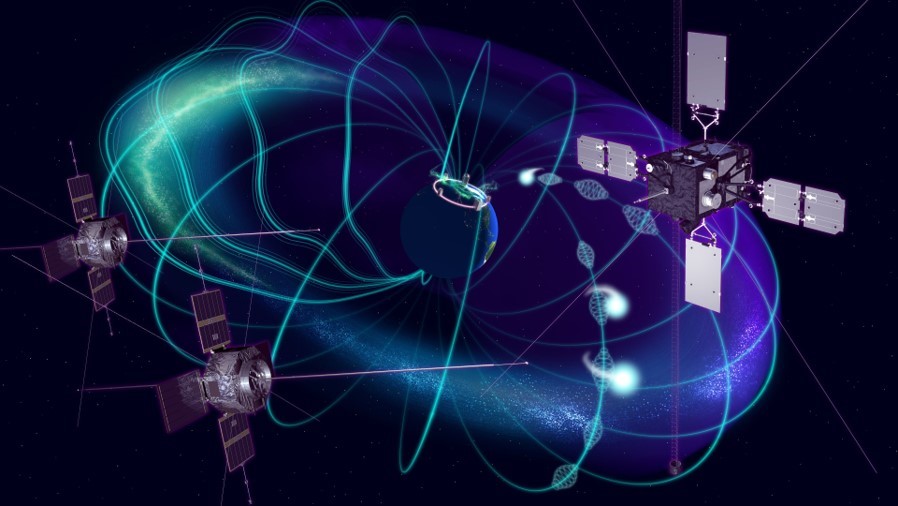copyright: ERG Science Team
Context
Geospace is a complex system, which contains charged particle populations ranging from thermal to ultra-relativistic energies and fluctuating in a highly dynamic manner. Variations in the flux and energy of these plasma populations, which are influenced by variations of magnetic and electric fields and plasma waves in the Earth's magnetosphere, caused both by the solar wind and by internal magnetospheric processes, result in a variety of space weather phenomena, some of which have serious adverse effects on space infrastructure. In the 2010’s, NASA/Van Allen Probes (2012-2019), JAXA/Arase(2016-present) and other satellites (NASA/THEMIS, MMS, USAF/DSX, ESA/Cluster) as well as various ground-based observations provided a new picture of geospace during solar cycle 24, both with respect to microscopic plasma processes and from the viewpoint of system science. Cross-regional/cross-energy and cross-scale couplings are important concepts to understand the geospace, which have been revealed by recent observations.
The purpose of this workshop is to summarize research on understanding and predicting dynamic processes/phenomena in geospace and on the adverse effects of space weather, based on observations during solar cycle 24. This workshop presents an overview of the latest discoveries, current scientific understanding on the geospace to establish the state-of-the-art concept for geospace. Theories will be summarized and reviewed critically according to their ability to address observed phenomena. The workshop and the book will document established facts and critical gaps in our current understanding for geospace and suggestions to the future directions.
Objectives
This workshop's main objectives are satellite data analysis, ground-based observers, theorist/modelers made for cooperation, and data from multi-instruments on a variety of spacecraft at different locations and ground-based observations. The workshop is adding value to these results through multidisciplinary research in the framework of the international colleagues. The workshop contributes to the achievement of a deeper understanding of geospace system and provides a suggestion about future missions. This workshop covers a broad range of geospace disciplines, including cold and warm plasma, radiation belt dynamics, ring current and cross-scale coupling etc. In this case, it will play a positive role to promote the co-operation between Chinese and the international scientists. Therefore, this workshop has significant value-added for Chinese space physics community and future cooperation for space science missions.
The topics covered in the Workshop
1) Geospace system-of-systems (including solar wind-geospace coupling)
2) Cold plasma dynamics (plasmasphere)
3) Warm/hot plasma dynamics (cloak/ring current)
4) Radiation belt dynamics
5) Current system
6) Acceleration/loss of particles through wave-particle interactions (including generation and propagation of various plasma waves)
7) Cross-regional couplings (magnetosphere-ionosphere,inner magnetosphere/plasma sheet,magnetosphere-thermosphere/lower atmosphere)
8) Cross-energy/scale couplings (cross-energy coupling, cross scale energy coupling)
9) Storm-substorm relationship
Product
Following the workshop, its output will be published as a volume in the Space Science Series of ISSI by Springer, in parallel with the publication of the papers in Space Science Reviews. It is expected that a total of up to 10 high-quality topical review papers will be submitted through the usual refereeing process and published in the book. The papers will be based on talks presented at the Workshop and will reflect the discussions that are encouraged to be held among the participants during the workshop, with emphasis on interdisciplinarity.
Date: 22-26 July 2024
Conveners
| Yoshizumi Miyoshi
| Institute for Space-Earth Environmental Research, Nagoya University, Japan |
| Kanako Seki
| University of Tokyo, Japan |
| Qiugang Zong
| Macau University of Science and Technology, China; Peking University, China |
| Sasha Ukhorskiy
| Applied Physics Laboratory, Johns Hopkins University, USA |
| Wen Li
| Boston University, USA |
| Ioannis A. Daglis
| University of Athens, Greece; Hellenic Space Center Greece |
| Chen Pengfei | Nanjing University, China |
Workshop Agenda
Workshop Handbook
Abstracts List
Presentations
Participant List
